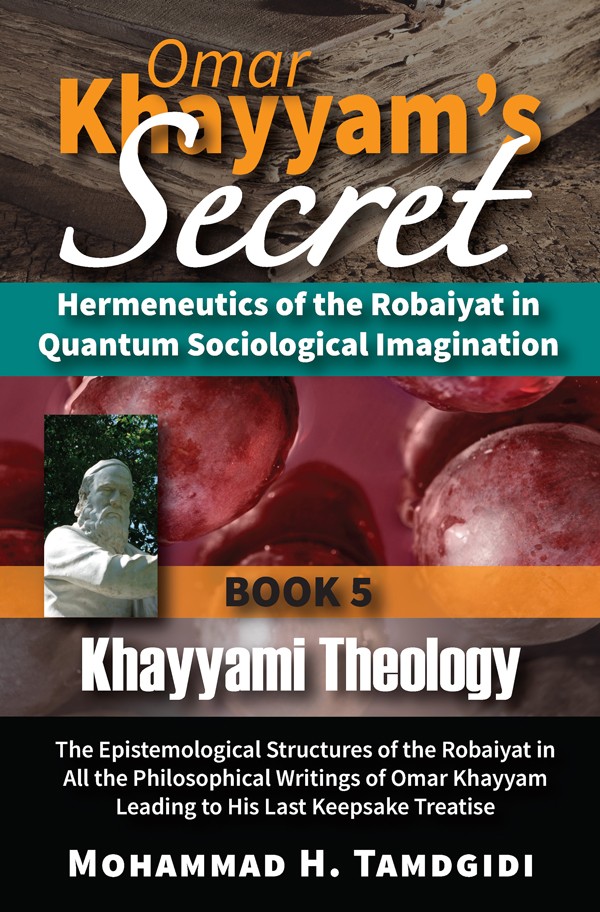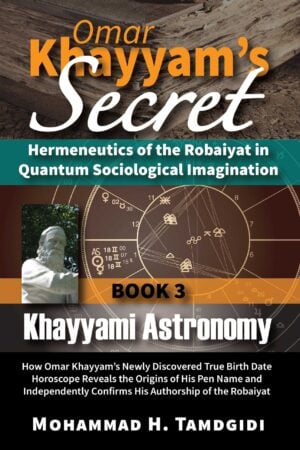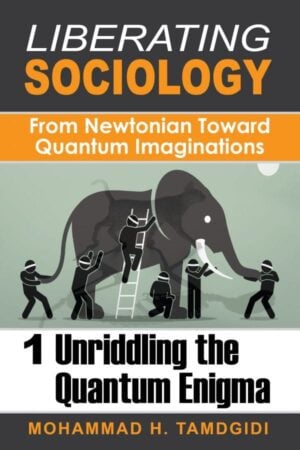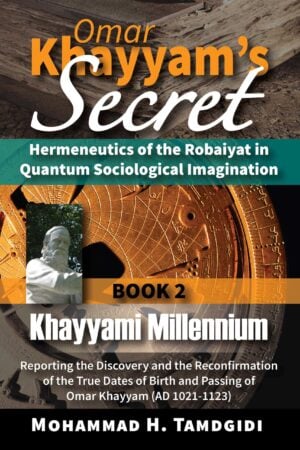Book Section: CHAPTER V — Part 3 of Omar Khayyam’s Treatise on Existence Addressed to Abu Taher Regarding the Light of Intellect on ‘Existent’ as the Subject Matter of Universal Science: The Arabic Manuscript and Updated Persian and New English Translations, Followed by Textual Analysis — by Mohammad H. Tamdgidi
$20.00
This essay titled “Part 3 of Omar Khayyam’s Treatise on Existence Addressed to Abu Taher Regarding the Light of Intellect on ‘Existent’ as the Subject Matter of Universal Science: The Arabic Manuscript and Updated Persian and New English Translations, Followed by Textual Analysis” is the fifth chapter of the book Khayyami Theology: The Epistemological Structures of the Robaiyat in All the Philosophical Writings of Omar Khayyam Leading to His Last Keepsake Treatise, which is the fifth volume of the twelve-book series Omar Khayyam’s Secret: Hermeneutics of the Robaiyat in Quantum Sociological Imagination, authored by Mohammad H. Tamdgidi.
Description
Abstract
This essay titled “Part 3 of Omar Khayyam’s Treatise on Existence Addressed to Abu Taher Regarding the Light of Intellect on ‘Existent’ as the Subject Matter of Universal Science: The Arabic Manuscript and Updated Persian and New English Translations, Followed by Textual Analysis” is the fifth chapter of the book Khayyami Theology: The Epistemological Structures of the Robaiyat in All the Philosophical Writings of Omar Khayyam Leading to His Last Keepsake Treatise, which is the fifth volume of the twelve-book series Omar Khayyam’s Secret: Hermeneutics of the Robaiyat in Quantum Sociological Imagination, authored by Mohammad H. Tamdgidi.
In this chapter, Tamdgidi first presents an updated/corrected Arabic edition of Khayyam’s “Treatise on the Existent,” one that has been more commonly known as the “Treatise on the Light of Intellect on the Subject Matter of Universal Science.” This updated edition is based on the only extant manuscript of this treatise, dated 699 LH accessible online at the Chester Beatty’s Digital Collections, as cited by Tamdgidi. Since much of the existing copies of this treatise are based on the 1912 Cairo edition of this manuscript in Jāmeʿ ol-Bādaʾeʿ, which is itself not entirely accurate in including all the elements of the originally handwritten manuscript text, Tamdgidi includes the Cairo edition changes in curved brackets, while indicating the words that were missing in the Cairo edition altogether, judging from the more accurate 699 LH dated manuscript. Some are minor, but a few are important. He then provides an updated Persian and a new English translation of the treatise. In offering his Persian translation of the treatise, Tamdgidi notes that he benefitted from both Persian translations hitherto offered by Samad Movahhed and Gholamreza Jamshidnejad Avval. However, in his renderings he has tried to follow the updated Arabic edition and also to offer a more accessible Persian translation.
Tamdgidi notes, regarding the title commonly attributed to this treatise, that it can be seen that its origin goes to the 1912 Cairo edition of it in Jāmeʿ ol-Bādaʾeʿ. Therein, the editors gave it that title as used also in their introduction to the treatise, using the expression “Light of the Intellect on the Subject Matter of Universal Science.” The Indian scholar Nadvi then used that title in his edition, and it was subsequently assumed by scholars that the title of the treatise was originally that title, and it became customary to refer to the treatise by the title “Light of the Intellect on the Subject Matter of Universal Science.” In Tamdgidi’s view, it is still worth keeping the latter as a subtitle for the treatise, however, with the understanding that the originally given title for this treatise as intended by its 699 LH scribe was simply “Treatise on the Existent.”
In this treatise Khayyam argues that the subject matter of the first philosophy, or metaphysics, which he reiterates is the universal science beneath which are all other sciences, must be regarded as “the existent.” It is important to consider “the light of intellect” on the subject matter of universal science, that is, “existent,” not simply as a descriptive, “added on” element to the subject matter of universal philosophy, but as being essentially implicated in it. And that is really what the essential point of the treatise studied in this chapter is, and there is a reason why Khayyam finds it so important that devotes his treatise to it.
In Khayyam’s worldview, God is one, and as he will remind us, by drawing on what he finds so important in Avicenna’s teaching, God’s very essence is His existence, or, His existence is His essence. All existence, therefore, essentially emanates from Him, including our own existence, as humankind, being speech-endowed, intelligent animals. So, we, as intelligent beings, should always recognize that our statement about the existence of anything is itself an intellective process, always implicating ourselves, our subjective world and capacities in the process. To say that something “exists,” whether objective (extra-mental) or subjective (mental), we are inescapably using our subjective, intellective capacities (one that, Khayyam will remind us, is not solely conceptual, but also perceptual/imaginal always as well). So, whether or not something exists cannot be addressed without taking into consideration our own attitude and relation to it.
To recognize that there is a “light of intellect” shed on the subject matter of science, it must be considered not as an added consideration, as if saying “we shed intellective light on a topic,” but to recognize that the subject matter itself cannot be understood without recognizing “the light of intellect” as an essential part of it. It is for this reason that Khayyam is insisting that we should not consider “existence” as an added attribute, an accidental feature, to “existent” but one that is inherently presumed in the subject matter itself.
Khayyam applies his reasoning to the notion of how a person can be considered to exist, even though objectively he has passed away, since the person’s existence has never been purely an “objective” but also a “subjective” process. So long as the person is remembered in our subjective worlds, he or she may be considered an existent in a broader human context. As noted before in this book, we should by now consider that Khayyam was a “specialist” on the specific topic of “existence,” as much of what he philosophically wrote focuses on it. For this reason, we should not be surprised ultimately to find that the very purpose of any poetry he may have written had to do with his way of grappling with the problem of existence, for the poetry itself can be considered as a way of perpetuating the existence of its author, so long as he composes it such that it can be remembered by later generations.
Recommended Citation
Tamdgidi, Mohammad H. 2022. “CHAPTER V—Part 3 of Omar Khayyam’s Treatise on Existence Addressed to Abu Taher Regarding the Light of Intellect on ‘Existent’ as the Subject Matter of Universal Science: The Arabic Manuscript and Updated Persian and New English Translations, Followed by Textual Analysis.” Pp. 305-346 in Omar Khayyam’s Secret: Hermeneutics of the Robaiyat in Quantum Sociological Imagination: Book 5: Khayyami Theology: The Epistemological Structures of the Robaiyat in All the Philosophical Writings of Omar Khayyam Leading to His Last Keepsake Treatise. (Human Architecture: Journal of the Sociology of Self-Knowledge: Vol. XVIII, 2022. Tayyebeh Series in East-West Research and Translation.) Belmont, MA: Okcir Press.
Where to Purchase Complete Book: The various editions of the volume of which this Book Section is a part can be ordered from the Okcir Store and all major online bookstores worldwide (such as Amazon, Barnes&Noble, Google Play, and others).
Read the Above Publication Online
To read the above publication online, you need to be logged in as an OKCIR Library member with a valid access. In that case just click on the large PDF icon below to access the publication. Make sure you refresh your browser page after logging in.
KHB6E-PREVIEWNOCOVER







